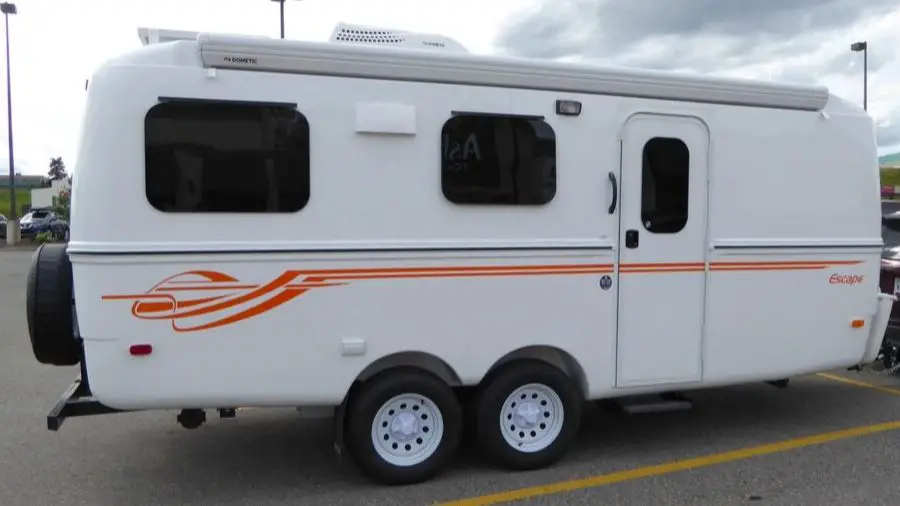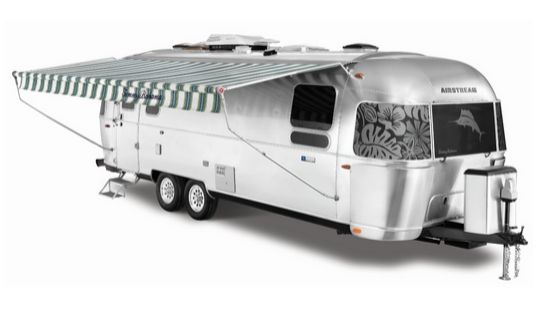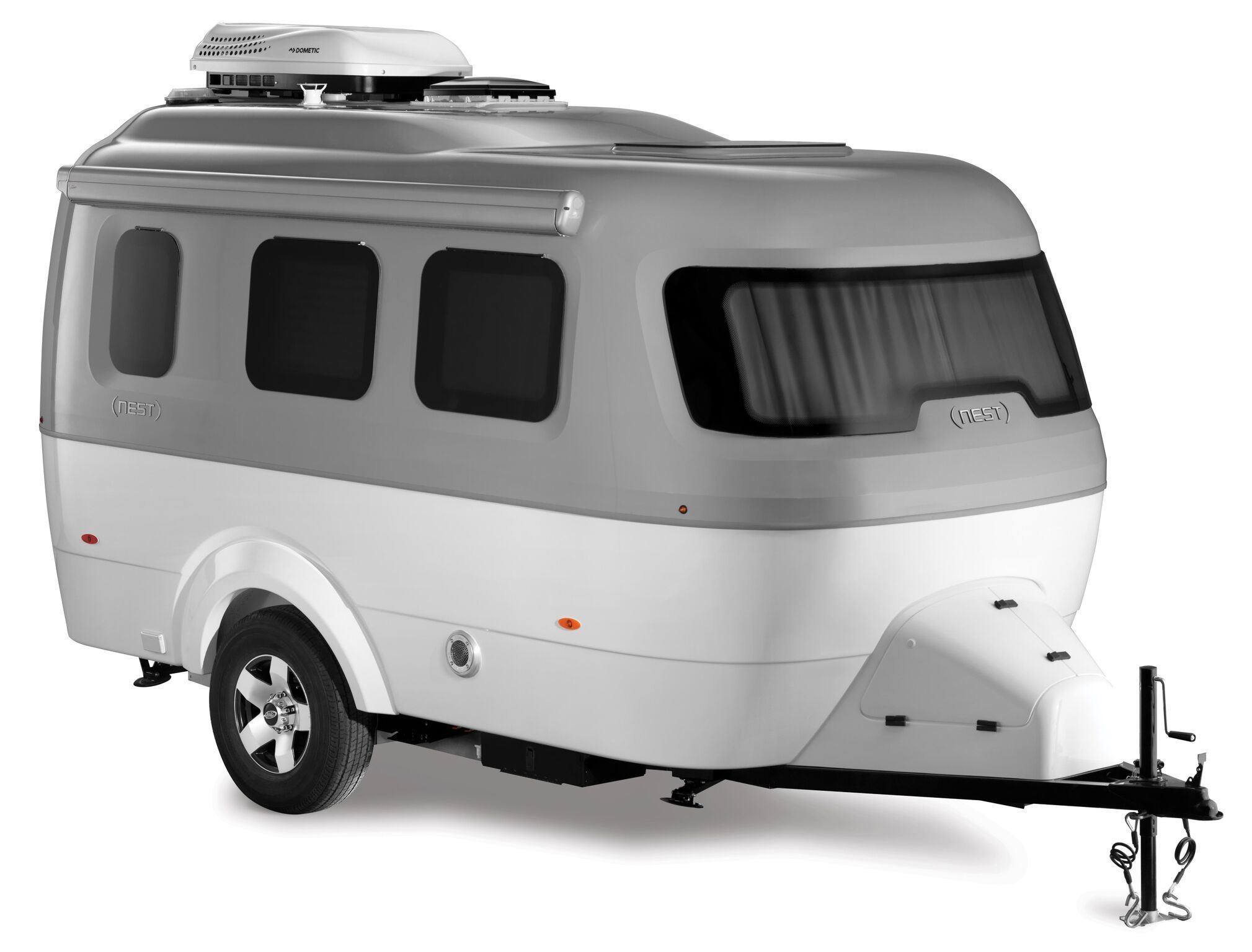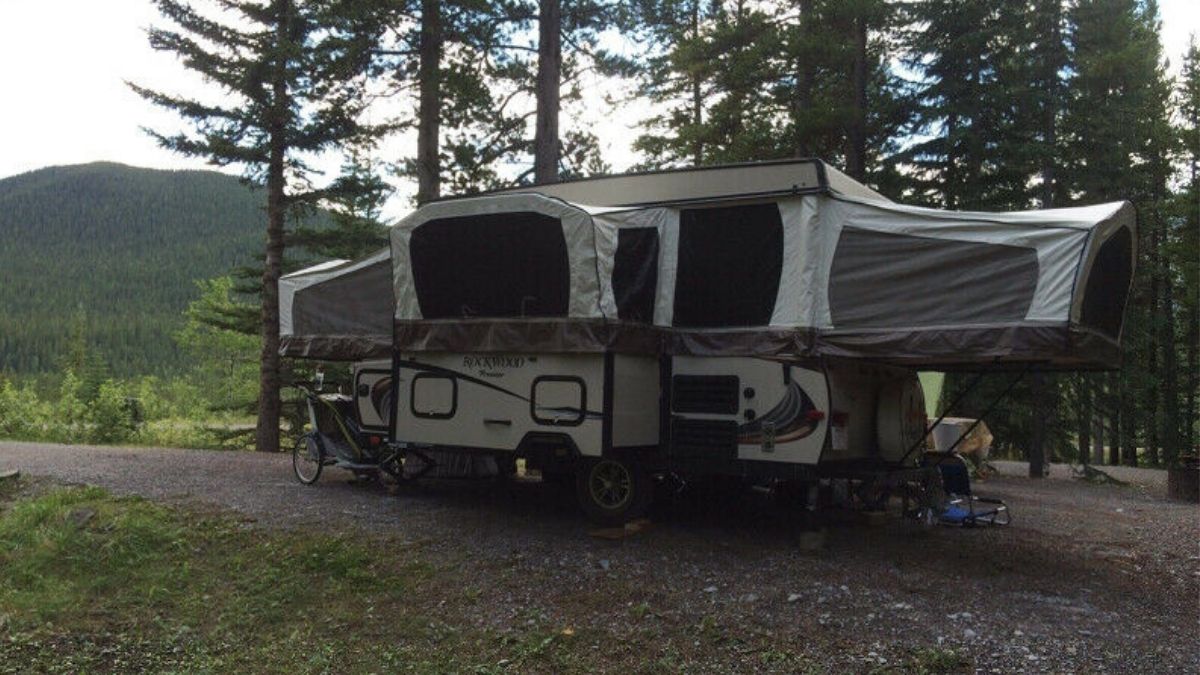Fiberglass trailers appear, by popular opinion, to be the best choice as the exterior for a travel trailer. Fiberglass trailers are:
- Better insulated.
- More water-resistant.
- Harder to damage when compared to other options.
The downside?
- They can be more expensive to purchase.
- More vulnerable to UV ray damage.
- Are heavier than trailers made from other materials, such as aluminum.
- Repairs to a fiberglass travel trailers can be a lot more expensive than repairing the same damage to an aluminum travel trailer.
Advantages of Fiberglass Trailers
The foam block insulation in Fiberglass travel trailers can block water leaks from reaching your floor and other parts of the trailer. The walls limit water damage and improve sound insulation. Most fiberglass trailers are better insulated in general, helping you stay cool when it is hot and can keep you warmer when it is cold. If you plan to go full time, the improved insulation can be a big help in controlling your electric bill. Electrical repairs are usually easier and therefore can be cheaper due to the solid fiberglass walls, which are unsuitable for electrical wiring. By necessity, the design of the electrical system makes the majority of it easily accessible. With a little electrical know-how, you can even make minor repairs yourself. Fiberglass can be molded into very visually appealing shapes. The sleeker finishes and contoured accents are extremely attractive, and one of the most appealing features of this material.
Like all travel trailers, fiberglass travel trailers need maintenance. Fiberglass travel trailers have busy maintenance schedules to keep the fiberglass shell from succumbing to the elements. Fiberglass travel trailers tend to be chosen for their roominess, which includes slide outs. Add in the maintenance of the slide outs and you can begin to see that they take more time and money to maintain than other options. What is important is that you get the knowledge you need to choose an exterior that fits your needs. So what do you need to know?
What Are the benefits of an aluminum travel trailer?
At the top of the list is price, they are thousands of dollars cheaper than fiberglass travel trailers. Many first time buyers aren’t sure if travel trailer camping is for them. With cheaper price tags, you can find a travel trailer tempting enough to make the investment worth it to go on that new adventure. The smaller price tag can also be more enticing for those who plan to only camp once or twice a year, bringing the dream of owning an RV into reality.
When an aluminum travel trailer is damaged, often only one or two pieces of the exterior of the trailer needs replacing. With a fiberglass travel trailer, any damage that penetrates the walls will require replacement of the entire side of the trailer, which can be very expensive. If you are handy, you can repair mild or moderate damage yourself at very little cost with an aluminum trailer. If you know a thing or two about construction, even major repairs can be done on the cheap. While Fiberglass trailers are better insulated in general, aluminum trailers can keep you warmer if you plan to do a lot of cold weather camping. There is a layer of “dead space air” in the construction of aluminum trailer walls that keep it warmer.
Most aluminum trailers have a wood frame with aluminum panels on the exterior. The interior is paneled with a layer of fiberglass insulation in the middle. With the right tools and know-how, you have a wider degree of modifications you can make to your travel trailer. Upgrading the insulation, running electrical wiring, hanging shelves, installing cabinets or even reconfiguring parts of the interior is possible. Aluminum trailers can also be much lighter than fiberglass trailers. With modifications, they can be made even lighter. If you don’t mind the snugness and you plan to travel long distances, a lighter trailer can make a difference in your gas bill. Some full-time RVers rave over the flexibility, lower cost, and easier maintenance schedule that an aluminum travel trailer gives them.
The iconic Airstream is an aluminum travel trailer. Known for their ruggedness and durability, they hold their value better than nearly every other travel trailer. Heirloom Airstream travel trailers, handed down through the family, are featured all over the internet. It would appear that a well-built aluminum travel trailer, such as an Airstream, beats the pants off of fiberglass travel trailers for longevity and durability. If you are considering living full time in an RV for the next 20 to 30 years and limited space is not an issue, this may be worth the investment. You will lose the benefit of a cheaper trailer, but you will gain a travel trailer that will last you for life. If it comes time to sell, you will be able to recoup a large chunk of the original purchase price.
Molded Fiberglass Travel Trailers
Most fiberglass travel trailer construction has some similarities to traditional home building techniques. Multiple panels of fiberglass walls are fastened together on a frame, sealed at the joints, and coated with a protective outer shell. This type of construction, though durable, requires a lot of maintenance. Molded fiberglass travels are constructed from two molded fiberglass pieces, leaving only one joint. Fiberglass glass is poured into molds to create the two halves of the trailer, making it extremely strong and lightweight. This model of construction produces a superior fiberglass travel trailer that is virtually waterproof and easier to maintain than other fiberglass models. They are light-weight making them easier and safer to tow, saving you gas money. Like well-built aluminum travel trailers, they hold their value well and when properly maintained, can last a lifetime. For someone who can foot the very hefty purchase price they carry and doesn’t plan to spend a great deal of time in their travel trailer, a molded fiberglass travel trailer may be the best long term option.
Molded fiberglass travel trailers tend to be smaller, built from two pieces of molded fiberglass sealed together for durability, their construction limits the size of the trailer. Molded fiberglass travel trailers tend to be quite cozy when compared to their constructed fiberglass counterparts. There are several manufacturers for molded fiberglass trailers. Trillium, Oliver, Bigfoot, Escape, Casita, Wisecraft, Scamp, and even Airstream has created the nest.
Just like the famous airstream, these trailers have a cult following all their own. Their owners plan events to camp together and revel in the lifestyle of freedom represented by these durable tiny homes on wheels.
What do I need to know about the frame?
Fiberglass travel trailers tend to be heavier than their aluminum counterparts. The weight of the shell itself along with the slide outs can put a lot of weight on the frame. You can run afoul here, so you need a little know-how. If the “Dry Weight”, the weight of the RV sitting on the frame straight off the factory floor, doesn’t leave you enough “CCC”, Cargo Carrying Capacity, you could be in for a surprise. Cargo is anything you add to the trailer once you purchase it. Food, clothes, supplies, tools, sports equipment and other things you plan to take with you can add up. Before you purchase an RV, be sure there is enough CCC to bear the weight of everything you plan to load in your travel trailer.
You can check out the weight specifications of any particular travel trailer by searching the make and model of the RV appended with “home page”. From there you can navigate to the RV you are browsing. Some specifications include CCC, but some do not. You can calculate the CCC if the specifications include the GVWR or “Gross Vehicle Weight Rating” and the Dry Weight of the travel trailer. Subtract the Dry Weight from the GVWR, and the result will be the CCC. You can also contact the manufacturer of the RV you would like to buy, most home pages have an email, forum or other ways to obtain details about their travel trailers.
When buying a fiberglass trailer, what you plan to take with you is as consideration. If you plan to go camping a few times a year, you can be very comfortable with what you can bring along. You may be planning to live in your RV for extended periods, such as wintering in a southern state. You can generally fit in most items you will need to be happy with your experience. If you plan to live in it full time, you will have to make choices. Everything you own will be going into the travel trailer. If your tow vehicle is a truck and your travel trailer isn’t a Fifth-Wheel, you can create some extra storage by adding a secure topper, turning the bed of your truck into the “Garage”. You will have to consider every item you plan to load into your travel trailer to be sure you are making a good decision.
Some travel trailer frames have a better reputation than others. As with all vehicles, some frames are well built and some are not. Once you have narrowed down your travel trailer choices be sure to search the internet for complaints about the frame of the travel trailers you are considering. In fact, it is a good idea to read complaints in general so you will be prepared for any problems common to the make and model you choose.
What About Fiberglass RV Maintenance
To be well maintained, a fiberglass RV demands a hefty maintenance schedule that is rigorously adhered to. If you do not maintain your RV properly, it will deteriorate quickly. Lack of diligent maintenance results in costly repairs, a decline in re-sale value and ultimately can make the RV uninhabitable. Repairs to restore an uninhabitable fiberglass RV can easily exceed buying the same RV used. If you plan to buy an RV, you will need to develop a maintenance schedule, stick with it and keep records.
Maintenance Of The Fiberglass Shell
- When not using your RV it should be stored indoors if possible or under an RV storage cover.
- Washing, polishing and spot waxing of the entire exterior is recommended monthly or after every trip.
- Deoxidizing and waxing the entire exterior is recommended yearly.If your travel trailer has a built-in generator you will need to change the oil and filter in it per the manufacturer’s instructions.
- Inspect all rubber seals and apply a rubber seal treatment every three months.
- Wash and inspect the roof monthly, repairing any cracks with a sealant, such as Decor. You will need to debris the crack with a nylon scraper and clean with denatured alcohol before applying the sealant.
- Treat any exposed metal with a silicone spray, including but not limited to slide tracks, steps, locks, pivot points of the awning, all door and compartment locks, screws and pivot points on the hitch.
Fiberglass shells will inevitably degrade over time as the gel coating wears off, even if you religiously care for the exterior. Deterioration can be delayed using specialized sanding and polishing techniques however, you will eventually need to have the gel-coat professionally removed and re-applied. The roof of your RV doesn’t escape eventual decline. There are various types of roofs, all with their own particular maintenance needs. You will need to know what kind of roof you have and maintain it accordingly. However, it will eventually need to be replaced.
If you can your travel trailer indoors and only use it several times a year, maintaining it will not be so labor-intensive. However if your travel trailer is stored outdoors or lived in regularly or full time, you will need to develop work habits that keep your RV in good shape. The regular, physical outdoor activity of maintaining your travel trailer is a good exercise if you don’t overdo it and it is a part of the RV lifestyle.
What Do I Need to Know About Fiberglass RV Repairs?
Repairs to a Fiberglass shell can be more expensive than an aluminum travel trailer. While it is true aluminum trailers develop dents more frequently than fiberglass trailers, they are much cheaper and easier to repair. Aluminum trailers are built more like traditional homes, with very basic knowledge, you can do small repairs yourself. Even major repairs on an aluminum trailer are far less when compared to fiberglass shells. Even minimal or moderate damage to a fiberglass trailer requires knowledge of the shell construction and the products and techniques used to complete repairs. For the vast majority of people, an understanding of fiberglass shell construction and repair is a foreign subject. Whether the damage is minor or major, you will likely need repairs done by a professional which can get pricey.
Repairs to an RV can be expensive, especially if you aren’t experienced enough to make small repairs. Buy a warranty that covers your entire travel trailer, including any flaws in the fiberglass shell or frame. A warranty is a must, whether you are buying used or new, repairs are an inevitable part of owning a travel trailer. In addition to normally expected repairs, new travel trailers tend to have at least two or three flaws coming off the assembly line that will need to be remedied. Used trailers, even if well maintained, will need repairs. Warranties can be confusing. First-time buyers, even when doing extensive research, can make bad decisions when choosing a warranty. Before buying an RV of any kind, always be sure that you have checked the reliability and service of the warranty you are choosing. Check warranty company’s reviews and choose wisely:
- Is the claims process easy?
- Do they pay for repairs?
- Do they seem to make a habit of denying claims?
- Are there customer service complaints?
- Are there numerous legitimate complaints?
Buy insurance for your trailer. Like a warranty, this is a must to avoid huge out of pocket expenses. You may save in the short term by declining insurance, but you will more likely than not have to pay for it in the long run. Some of the most expensive damage can be done in an auto accident or a heavy object falling on your RV. Research is key, vet insurance companies, in the same manner, you would investigate a warranty. Be sure you are thoroughly covered by reading prospective policies. Lack of proper insurance coverage could result in extremely large repair bills if an incident occurs. When shell repairs are needed, you can choose between high-end repair shops in dealerships, independent companies that specialize in repairing RVs or independent mobile repairmen who do small repairs. Dealerships tend to be the priciest. Small, independent shops tend to be less expensive. Independent contractors can vary widely, get estimates. Some minor damage can be repaired by mobiles contractors, but for any significant damage and you will need to take it to a repair shop where they have the necessary equipment and products.
Research, Read And Take Notes
Before purchasing an RV, you should thoroughly investigate all aspects of owning an RV. From construction and durability to maintenance and repairs, you should have a thorough understanding of what to expect from your travel trailer. Functionality, floor plan, and amenities are also important considerations. Insurance premiums, repairs, and other monthly expenses should be calculated. All of which must be taken into consideration when choosing an RV that is right for your needs and within your budget. Owning a travel trailer can be a very rewarding experience. You can get out in nature and it makes traveling more frequently economical. To get the most of your experience, educate yourself before you buy it.







